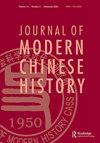Airborne prawns and decayed rice: food politics in Wartime Chongqing
IF 0.1
4区 历史学
Q4 HISTORY
引用次数: 1
Abstract
ABSTRACT This article explores the multilayered dimensions of food politics in wartime Chongqing. A substantial number of wartime Chongqing dwellers were migrants who flocked to the city, having evacuated from coastal China to follow the Nationalists after the outbreak of the Sino-Japanese War. They could not simply be called refugees. Rather, they were sophisticated urbanites known by Chongqing natives as “downriver folks” who brought their political awareness and cultural tastes to the new wartime capital. Some introduced their sumptuous dining culture to Chongqing, thereby provoking a public sense of deprivation, while others brought organizational skills with which to turn public discontent into a political issue. This article argues that an increasing sense of deprivation stemming from the deterioration of the food situation in the city, if seemingly less significant than massive rural famine, became more consequential in the long run than any other political issue in the subsequent Civil War years.空降大虾与腐米:战时重庆的食物政治
本文探讨了战时重庆食物政治的多层次维度。战时的重庆居民中,有相当一部分是在甲午战争爆发后跟随国民党从中国沿海地区撤离到重庆的移民。他们不能简单地被称为难民。相反,他们是被重庆本地人称为“下游乡亲”的城里人,他们把自己的政治意识和文化品味带到了战时的新首都。一些人将他们的奢华饮食文化引入重庆,从而引发了公众的剥夺感,而另一些人则带来了组织技巧,将公众的不满转化为政治问题。这篇文章认为,由于城市食物状况的恶化而产生的日益严重的剥夺感,虽然看起来没有农村大规模饥荒那么重要,但从长远来看,在随后的内战时期,这种剥夺感比任何其他政治问题都更重要。
本文章由计算机程序翻译,如有差异,请以英文原文为准。
求助全文
约1分钟内获得全文
求助全文

 求助内容:
求助内容: 应助结果提醒方式:
应助结果提醒方式:


